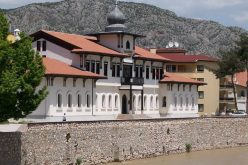Magnesia

Magnesia
Magnesia ad Maeandrum, ancient inland city of Ionia, situated on a small tributary of the Maeander (Büyükmenderes) River about 12 miles southeast of Ephesus. According to Strabo, it was founded by some Thessalian Magnetes, who had collected fellow settlers from Crete en route. Accounted an Aeolian city, it was never, despite its early prosperity, included in the Ionian League. Destroyed in the Cimmerian invasion of c. 650 bc, it slowly recovered and became the residence of Oroetes, the Persian satrap, who murdered Polycrates of Samos there about 522, and later of the exiled Themistocles, who received it, with other towns, from Artaxerxes I and issued some Magnesian coins about 460. Too far inland to enter the Athenian Empire, it was transplanted some time later to a more defensible site among the eastern foothills of Mt. Thorax. The new city assumed a monumental form about 200 bc. It continued to flourish under the kings of Pergamon and the Roman Republic, and produced Hegesias, founder of the rhetorical school called “Asiatic.” It resisted Mithradates VI of Pontus in 87 bc, and was rewarded with political freedom by Sulla. It appears to have declined under the empire, though on a rare bronze coin of the time of Gordian III (ad 238–244) it still calls itself the seventh city of Asia.
Related Articles
Write a Comment
Only registered users can comment.












